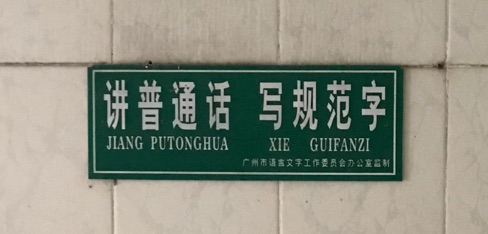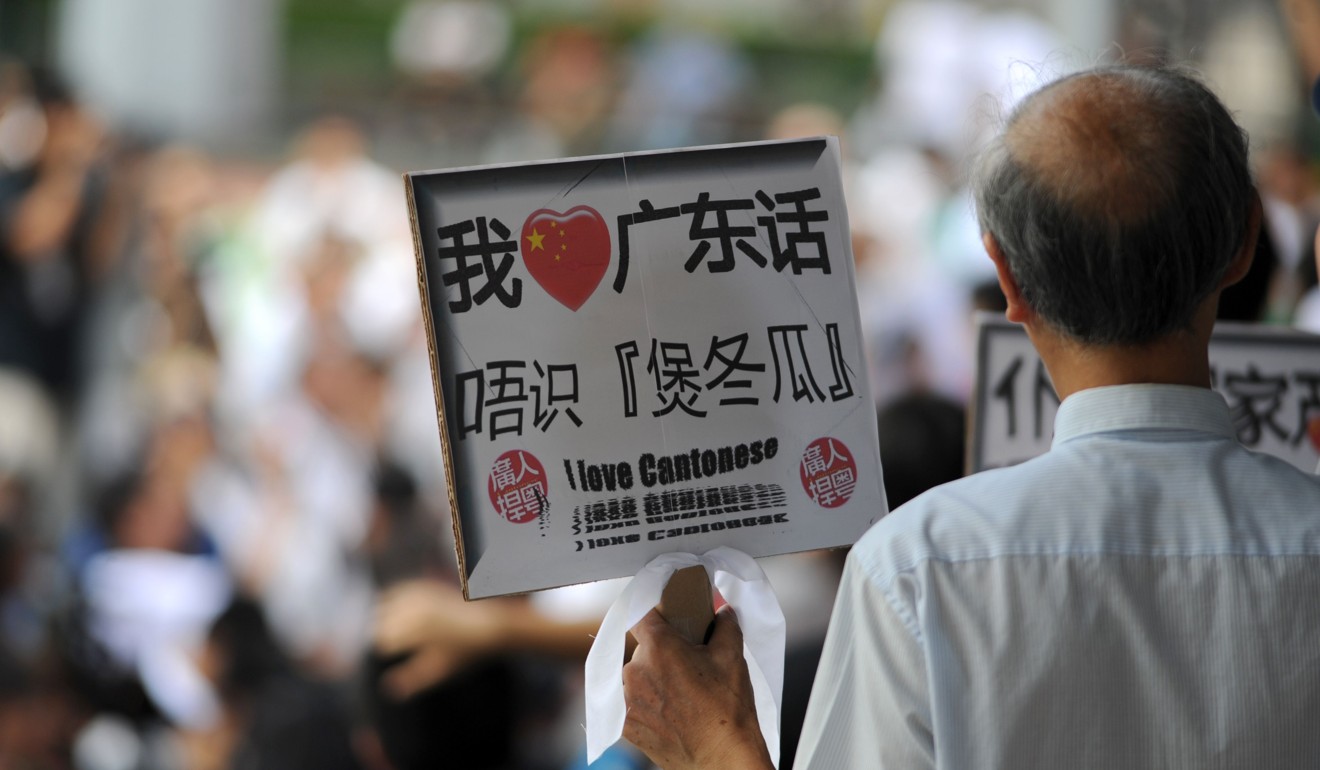Archive for Standard language
September 19, 2023 @ 6:35 pm· Filed by Victor Mair under Language and politics, Standard language
China’s Language Police
Why Beijing Seeks to Extend the Hegemony of Mandarin
By Gina Anne Tam, Foreign Affairs
September 19, 2023
It's odd that the author knows about "topolect" and recognizes the inadequacy of "dialect" as a rendering of fāngyán 方言, but is unwilling to mention "topolect" in this article, which is so suitable for it. Maybe the unwillingness to shake off that millennial misconception about there only being one Chinese language and a host of "dialects" is part of the problem for the precarious situation in which they find themselves.
In late August, authorities in Hong Kong raided the home of Andrew Chan, the founder of a Cantonese-language advocacy group called the Hong Kong Language Learning Association. National security police questioned Chan about an essay contest the group hosted three years earlier for literature composed in Cantonese, the lingua franca of Hong Kong. One of the finalists in the contest was a fictional futuristic short story about a young man seeking to recover histories of Hong Kong lost to authoritarian erasure. During a warrantless search of his home, they demanded that Chan remove the work from his website, threatening severe consequences for him and his family. Afterward, Chan put out a statement that he had no choice but to dissolve his group entirely, an organization that had worked to promote Hong Kong’s culture through the preservation of the Cantonese language for nearly ten years.
Read the rest of this entry »
Permalink
July 4, 2023 @ 6:14 am· Filed by Victor Mair under Grammar, Language and the law, Standard language
Reader Scott Mauldin asks:
I am curious about a unique usage I read in SCOTUS Justice Ketanji Jackson's dissent to the recent cases on affirmative action. She says “This contention blinks both history and reality in ways too numerous to count.” To me, the usage of "blink" as an transitive verb to mean [I assume] something like "ignore" was completely novel. To see what to me is a nonstandard usage show up in a Supreme Court dissent was strange. Is this common usage in some communities, and if so would you or your readers happen to have information on that usage?
Read the rest of this entry »
Permalink
July 4, 2022 @ 6:45 am· Filed by Victor Mair under Dialects, Pronunciation, Standard language, Topolects, Toponymy
Continuing my run through the Midwest, among many others, I have passed through the following towns and counties: Lima, Cairo, Gomer, Delphos, Van Wert, Warsaw, Kosciusko, Hamlet, Wanatah, and Valparaiso. These names reflect the variety of ethnicities and origins of the inhabitants. Several of them are locally pronounced in ways that I had not expected:
Lima is Laima, not Leema (one of my students flew to the capital of Peru that same day I went to its reputed namesake in Ohio).
Cairo OH is Kayro, not Kairo; I don't know for sure how the same name of the southernmost city in Illinois is pronounced locally.
Kosciusko is Kaziasko, not Koskiusko.
Valparaiso is colloquially known as Valpo.
Read the rest of this entry »
Permalink
March 12, 2022 @ 9:57 pm· Filed by Victor Mair under Dialects, Language and computers, Language and the media, Language teaching and learning, Standard language, Topolects, Writing systems
We've just been through the problems of standard language versus the vernaculars in Arabic (see "Selected readings" below). Now we're going to look at a photograph, a caption, a book review, and a letter to the editor that encompass these contentious issues in spades — but for Chinese. Here's the photograph:

Read the rest of this entry »
Permalink
March 8, 2022 @ 6:07 am· Filed by Victor Mair under Standard language, Topolects, Vernacular
To refresh our collective memory and to provide the context for the present post and the other posts in this series, I repeat the following questions:
1. Is there such a thing as "Classical Arabic"? If there is, how do we describe / define it?
2. What is "Standard Arabic"?
3. What is Quranic Arabic? How different is it from Standard Arabic?
4. How many vernacular Arabic languages are there? Egyptian? Syrian? Lebanese? Are they quite different from Standard Arabic? Are they mutually intelligible? Do they customarily have written forms and a flourishing literature?
—
You may also wish to revisit the introduction with which the first post in the series began. It was followed by a lively, informative discussion in the comments.
Devin Stewart offered the following illuminating response:
These are some tough questions to answer, and the answers are all going to be impressionistic, but just to give you a own sense of a few guidelines for beginning to understand the dialect situation.
Read the rest of this entry »
Permalink
March 6, 2022 @ 8:09 am· Filed by Victor Mair under Classification, Language and literature, Language and religion, Standard language, Vernacular
With this post, I will begin a series on the nature of the Arabic group of languages. My reason for doing so is that many people are badly confused about just what "Arabic" (a Semitic group) signifies when it comes to language, almost as badly confused as most people are about "Chinese" (linguistically more properly referred to as Sinitic).
For a basic, foundational statement, here are the opening two paragraphs of the Wikipedia article on "Arabic":
Arabic (اَلْعَرَبِيَّةُ, al-ʿarabiyyah [al ʕaraˈbijːa] ( listen) or عَرَبِيّ, ʿarabīy [ˈʕarabiː] (
listen) or عَرَبِيّ, ʿarabīy [ˈʕarabiː] ( listen) or [ʕaraˈbij]) is a Semitic language that first emerged in the 1st to 4th centuries CE. It is the lingua franca of the Arab world and the liturgical language of Islam. It is named after the Arabs, a term initially used to describe peoples living in the Arabian Peninsula bounded by eastern Egypt in the west, Mesopotamia in the east, and the Anti-Lebanon mountains and northern Syria in the north, as perceived by ancient Greek geographers. The ISO assigns language codes to 32 varieties of Arabic, including its standard form, Modern Standard Arabic, also referred to as Literary Arabic, which is modernized Classical Arabic. This distinction exists primarily among Western linguists; Arabic speakers themselves generally do not distinguish between Modern Standard Arabic and Classical Arabic, but rather refer to both as al-ʿarabiyyatu l-fuṣḥā (اَلعَرَبِيَّةُ ٱلْفُصْحَىٰ "the eloquent Arabic") or simply al-fuṣḥā (اَلْفُصْحَىٰ).
listen) or [ʕaraˈbij]) is a Semitic language that first emerged in the 1st to 4th centuries CE. It is the lingua franca of the Arab world and the liturgical language of Islam. It is named after the Arabs, a term initially used to describe peoples living in the Arabian Peninsula bounded by eastern Egypt in the west, Mesopotamia in the east, and the Anti-Lebanon mountains and northern Syria in the north, as perceived by ancient Greek geographers. The ISO assigns language codes to 32 varieties of Arabic, including its standard form, Modern Standard Arabic, also referred to as Literary Arabic, which is modernized Classical Arabic. This distinction exists primarily among Western linguists; Arabic speakers themselves generally do not distinguish between Modern Standard Arabic and Classical Arabic, but rather refer to both as al-ʿarabiyyatu l-fuṣḥā (اَلعَرَبِيَّةُ ٱلْفُصْحَىٰ "the eloquent Arabic") or simply al-fuṣḥā (اَلْفُصْحَىٰ).
Read the rest of this entry »
Permalink
August 26, 2020 @ 5:08 pm· Filed by Victor Mair under Intonation, Orality, Phonetics and phonology, Prosody, Standard language, Tones, Topolects
Some folks think that intonation never overrides tones, but I'm convinced on the basis of empirical evidence that it does.
For example:
Nǐ xiǎng gàn hā 你想干哈 –> Nǐ xiǎng gàn há 你想干哈 ("what do you want to do?") — especially in the Northeast.
Here are some other examples — all of them provided by native speakers of MSM (Modern Standard Mandarin):
A.
1. 不( bù ["no"]):Sometimes, I would say 不 ( bú) even though there is no falling tone character after 不 to invoke tone sandhi, such as "我不 ( bú)". This happens when somebody asks me to do something I don't like, I will say 不 ( bú) to express my rejection.
2.中间 (zhōngjiān ["in; among; between; amidst"]): Sometimes, I would say 中间 (zhōngjiàn)to emphasize the place. I think most people will commonly pronounce this phrase as 中间 (zhōngjiàn), but it is "wrong".
3. 都 (dōu ["all"]): I will pronounce this character as dóu when I want to emphasize the meaning "all." For example, 我都 (dóu) 写完了 I finish them all, 他都 (dóu) 吃完了,he ate them all. But here, I am thinking about whether I am influenced by 东北 Northeastern / dongbei topolect because I think dongbei people will commonly use the pronunciation dóu .
Read the rest of this entry »
Permalink
May 30, 2020 @ 9:30 pm· Filed by Victor Mair under Diglossia and digraphia, Romanization, Signs, Standard language, Transcription
Sign on the wall of a school:

(Source)
Read the rest of this entry »
Permalink
December 2, 2018 @ 4:53 pm· Filed by Victor Mair under Standard language, Topolects
[This is a guest post by C K Wang]
When we went to the primary school we were forbidden to speak Taiwanese in public. We spoke Taiwanese at home and when there were no strangers around. So people in my generation speak Taiwanese well—we have kept the mother tongue. I told stories from 西遊記* to Andrea and Clare in Taiwanese and they talked and still talk to each other in Taiwanese, though they were required to speak Mandarin at all time in school
Read the rest of this entry »
Permalink
April 11, 2018 @ 9:15 pm· Filed by Neal Goldfarb under Dialects, Dictionaries, Language and society, Language attitudes, Language teaching and learning, Prescriptivist non-poppycock, Standard language, Usage
One of the most well-known pieces of lexicographic history is the controversy that greeted the publication of Webster’s Third New International Dictionary. Whereas the predecessor of W3, Webster’s Second New etc., had been regarded as authoritatively prescriptive, W3 was condemned in the popular media for its descriptive approach, the widespread perception of which can be boiled down to “anything goes.” (For the details, see The Story of Webster’s Third by Herbert Morton and The Story of Ain’t by David Skinner.)
I recently came across two articles that seem to be largely unknown but deserve wider attention—one by the General Editor of W2 (Thomas Knott), and the other by the Editor-in-Chief of W3 (Philip Gove). Each article is notable by itself because it fleshes out the author’s attitude toward usage and correctness, and does so in a way that undermines the stereotype that is associated with the dictionary each one worked on. And when the two articles are considered together, they suggest that despite the very different reputation of the two dictionaries, the authors’ attitudes toward usage and correctness probably weren’t far apart.
Read the rest of this entry »
Permalink
December 3, 2017 @ 1:10 pm· Filed by Victor Mair under Signs, Standard language, Translation
If you see the two big letters "GB" in the top right corner of an official publication from the Chinese government, you know it's serious. Those letters stand for Guójiā Biāozhǔn 国家标准 ("National standard").
In the present instance, they have promulgated, as of December 1, 2017, "Guidelines for the use of English in public service areas — Part 9: Accommodation and catering". They also have issued similar guidelines for transportation, tourism, culture and entertainment, sports and athletics, education, medicine and sanitation / health / hygiene, communication, and commerce / business and finance.
Read the rest of this entry »
Permalink
October 12, 2017 @ 9:03 pm· Filed by Victor Mair under Classification, Puns, Standard language, Transcription, Writing
Pro-Cantonese sign in Hong Kong:

A man holds a sign professing his love for Cantonese as he attends a Hong Kong rally in 2010 against mainland China’s bid to champion Mandarin over Cantonese. Picture: AFP
Read the rest of this entry »
Permalink


